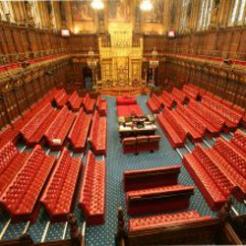The House of Lords has passed amendments to the Charities (Protection and Social Investment) Bill to block an extension of the right to buy scheme, and to require the Charity Commission to defend charities from having their assets sequestrated.
A clause to force charities to reveal details about fundraising practices in their annual reports was also introduced into the bill on Monday.
Right to buy amendments
The Government’s right to buy scheme faced a major setback after peers voted 257 to 174 in favour of an amendment to ensure that "charities are not compelled to use or dispose of their assets in a way which is inconsistent with their charitable purposes”.
The amendments are a response to Conservative proposals to extend right to buy to housing associations, which have charitable status.
The proposals have been criticised because the proposals would allow government to force charities to sell assets in a way which they feel does not serve their charitable purposes.
At the pre-vote discussion on Monday, Lord Kerslake, a crossbench peer and chair of the Peabody housing association, said the government’s plans were “a major disincentive to charitable benefactors to donate their money or land to good causes when the government can directly intervene and direct the sale of those assets for very different purposes”.
Labour peer Baroness Hayter of Kentish Town said: “The concern is that the Government want to interfere with the duties of charitable trustees to put their beneficiaries first and comply with their own trust deed.”
'Not the time or place'
But amendments to the bill came under criticism from some quarters during the discussions on Monday.
Criticism came from Conservative peer Lord Cormack who said it was “not really the time or the place to debate” the issue.
“Whether we like it or not — and as I made plain, I do not particularly like it — it was a government pledge,” he said. “I hope that, the subject having been aired, this amendment will be withdrawn.
“This is not the bill to tackle this extremely important social issue, and I hope that we do not proceed to a division this afternoon.”
Concerns were also raised about potential pressure that an amendment to the bill would put on the Charity Commission.
Viscount Eccles, a Conservative peer, said the amendment to the bill would place “a duty on the Charity Commission that it would never be able to perform”.
“It only needs Parliament to make some decision or another for this amendment to become inoperable by the Commission," he said. "The Commission must be hoping that the amendment is not passed, because it would in no way be in its interests if it were.”
'Christmas tree bill'
The Conservative Lord Hodgson of Astley Abbotts said the Charities bill was in danger of becoming a “Christmas tree bill” subject to "bells and whistles" amendments “that are quite out with the original idea”.
Hodgson said: “The House should not lose sight of the central purpose of this bill, which is to make more effective—to improve—the regulatory powers of the Charity Commission and to enable the development of the social investment movement,” he said.
“If we go down the slippery slope of trying to add more bells and whistles to the bill at this stage, we will be making a big mistake,” he said.
Fundraising amendments
The House of Lords also agreed on Monday to insert a fundraising clause to force charities to reveal details about fundraising practices.
The amendment comes in light of media scrutiny following the death of Olive Cooke in March.
“We cannot have a 'don’t ask, don’t tell' approach in the sector, where a charity’s chief executives and trustees choose not to attend in any great depth to how their organisation engages the public when fundraising” said Lord Bridges of Headley, a Conservative peer and Parliamentary secretary in the Cabinet Office, who moved the bill.
“The chief executive’s responsibility for fundraising cannot end with simply demanding that the fundraising director brings the money in while he or she focuses exclusively on the charity’s mission in the field,” he said.
The amendment will require third-party fundraising organisations to include “fundraising standards” into contracts with the charities that employ them.
The 'fundraising standards contract' will include details about the fundraisers’ protection of vulnerable people and the charity’s monitoring of how those standards are met.
Bridges said the amendment would encourage clarity about “what will be done in the charity’s name, and about their respective responsibilities”.
A second amendment requires that charities with an income of over £1m provide clear information in their annual reports about the methods of fundraising used.
“The point is to require the leadership of a charity to take responsibility for their fundraising practice and set it out for all to see," said Bridges.
“This is intended to complement a strengthened self-regulatory system, not to replace it,” he said.









